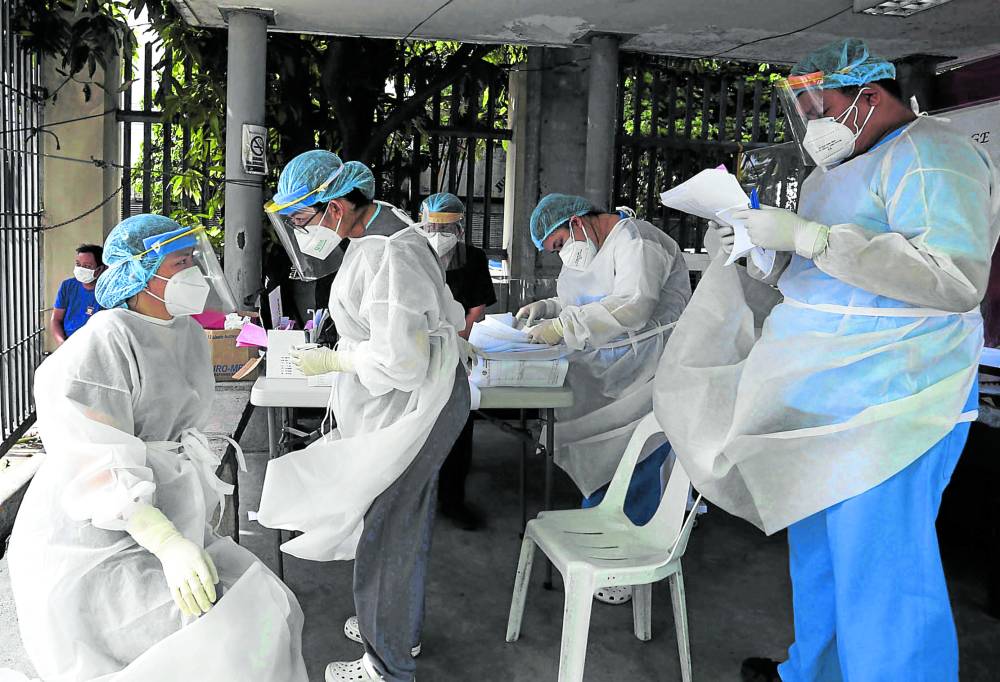A coalition of private healthcare workers is calling for a review of the continuing professional development (CPD) law as it wants to pass the burden of paying training program fees to hospitals.
In a press conference on Thursday, convenors of the United Private Hospital Unions of Philippines (UPHUP) noted how healthcare workers have been weighed down by the requirements and costs under the CPD law just to renew their licenses.
“We are not totally against the CPD law. It’s actually good for our personal advancement. But we hope the law is [amended] because it has become a burden to us health professionals,” said nurse Ronald Ignacio, a convenor of UPHUP.
Ignacio, also a member of the Ugnayan ng mga Nagkakaisang Manggagawa at the University of Santo Tomas (UST) Hospital, stressed that the law could be revised to require medical institutions to shoulder the fees of CPD programs, adding that hospitals also “benefit from the advancement of our careers.”
Must earn credits
According to Aileen Jabilon, also a UPHUP convenor, nurses like her need to shell out around P15,000 to complete 15 units every three years.
A single seminar that costs P2,000 to P3,000 usually covers only three units, she added.
“We’re rendering more than 12 hours of work [every day] so we can provide quality care to patients. But on top of that, we need to earn credits and attend seminars just to get CPD units,” Jabilon pointed out.
“So we have no choice but to set aside money from our measly salary just to earn CPD units. How about our personal expenses? [Our pay] is really not enough,” she said.
A nurse for 16 years at UST Hospital, Jabilon earns a basic pay of P30,000 a month. This is in stark contrast to her counterparts in public hospitals whose entry-level pay is already at Salary Grade 15, which is equivalent to P36,619, based on the fourth and final tranche of pay increases this year under the salary standardization law.
While Jabilon recognized the gains the CPD policy would have on her career, she lamented how the constant demands of her job while being “overworked and underpaid” has taken a toll on her health and overall well-being.
Financial burden
A measure that lapsed into law on July 21, 2016, Republic Act No. 10912, or the CPD Act, mandates registered and licensed professionals, such as nurses, to complete the compulsory units every three years, or as otherwise specified by the board of the Professional Regulatory Commission (PRC), before they can renew their professional identification cards.
While the law describes it as a “lifelong learning process” for the enhancement of a professional’s competencies, the added cost of earning the required units has become a burden on many of them.
In the previous Congress, Sen. JV Ejercito had filed a bill seeking to repeal the CPD law.
“While the CPD Act aims to develop and maintain professional competencies by serving as a gateway in gaining new skills and knowledge in their professions, compliance to the law does not come cheap, particularly for struggling professionals,” Ejercito’s measure stated, adding that it had caused a “costly burden” on Filipino professionals amid the rising inflation.
“At this time, when … Filipinos struggle with soaring food prices, the 2.56 million registered Filipino professionals do not need the additional costly burden of complying with their CPD requirements. Thus, the CPD Act needs to be repealed,” the bill said.
Since its implementation, the CPD law has been met with negative feedback from workers and professionals, among them teachers, engineers, accountants, physicians, and nurses.
An online survey conducted last year by the PRC on the CPD implementation noted that about 95 percent of respondents said the law should be stopped, citing as the main reasons the exorbitant fees, difficult requirements, confusing processes, and lack of accredited training providers for the CPD requisites.
Meanwhile, UPHUP said it was also counting on President Marcos to make good on his earlier promise of bridging the salary gap between private and public healthcare workers.
Matching gov’t rates
The group wanted the hazard pay to be institutionalized for private healthcare workers and raise this additional compensation to match the rates given in government facilities estimated at P9,000 monthly.
According to Jesus Obien, union president of the Chinese General Hospital Employees’ Association, private hospital employees, mostly those designated at the emergency room and intensive care unit, receive a measly P100 to P300 a month.
Not unionized
Healthcare workers in private hospitals that are “not unionized” may not even be granted hazard pay as this is usually provided under a collective bargaining agreement between the hospital union and management, according to Obien.
UPHUP is a newly formed coalition of unions from 26 private hospitals across the country. Among its members are workers from Cardinal Santos Medical Center, Cebu Velez General Hospital, Makati Medical Center, Medical Center Manila, San Juan de Dios Hospital, St. Luke’s Medical Center Taguig, and University of the East Ramon Magsaysay Medical Center.
READ: House passes bill amending Continuing Professional Development Act
